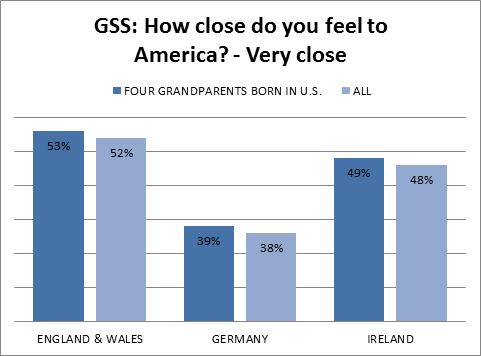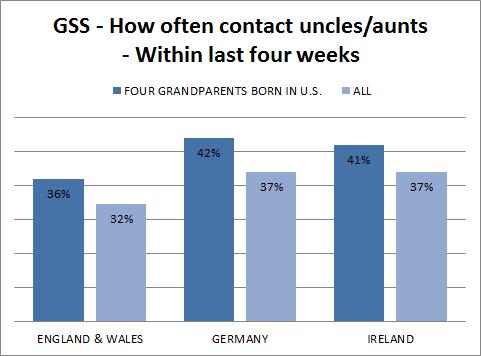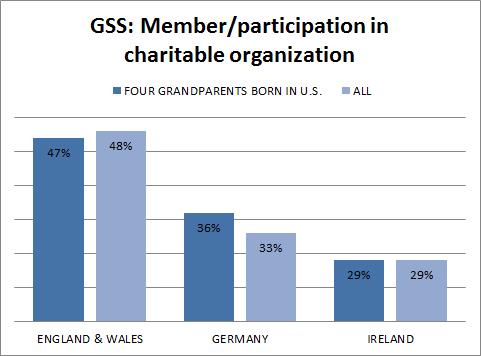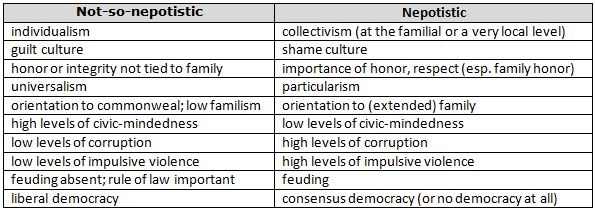update 10/17: some extra notes in the comments about the gss data here and here. thanks for the thought-filled comments, guys! (^_^)
_____
bennett and lotus (in America 3.0) have the very right idea that anglo-saxons have been living in absolute nuclear families and behaving very “anglo-saxony” for centuries, but they’ve got, imho, the very wrong idea that if other peoples, non-anglo-saxon peoples, just start living like anglo-saxons in absolute nuclear families, they will — via some sort of cultural osmosis or something — start behaving all anglo-saxony, too. i’m not convinced. where, i would ask, is the evidence for this?
in the comments to one of my previous posts on this subject, i pointed out that, for example, italian american families, most of which have been in the u.s. for multiple generations now, are mostly absolute nuclear families — at least they appear to be on the surface. however, italian americans are really strongly attached to their extended families in ways that anglo-americans simply are not. here’s what i said (or, rather, what i quoted):
from “Community and Identity in Italian American Life” in The Review of Italian American Studies (2000) [pgs. 250-251]:
“Family gatherings…are still part of Italian American life….
“Italian Americans, even the more affluent, remain in inner-city enclaves more than other groups do. When Italian Americans do move, many times two or more generations are involved in the exodus to a new suburban residence. If they do not locate together, Italian American family members find residences within short distances of one another. When upwardly mobile children leave their inner-city parents for the suburbs, they visit them more than any other group. When leaving the extended family, Italian Americans most often move into some modified extended family arrangement characterized by continual economic and social exchanges. Similarly, Italian American middle- and working-class children are more likely to take geographical proximity to the family into account when considering college attendance. Contemporary Italian American youth spread their wings, but not too far.
“Although crude survey data indicate that Italian Americans are increasingly intermarrying, these measures miss the reality that many times it is the non-Italian marriage partner who is drawn into the powerful magnet of the Italian American family. In addition, intermarriage need no diminish the ethnicity of the Italian American partner nor does it mean necessarily that the offspring will not be reared in the Italian American way. Italian Americans are more entrepreneurial than most; family businesses, by definition, provide not only income and independence from outsiders but also keep the family together. Socially mobile Itlaian Americans are willing to sacrifice some career and employment opportunities in order to stay within the orbit of family life.”
and from The Italian American Experience (2000) [pgs. 210-211, 373-374]:
“For a long time, it was believed that this sequence was inevitably moving toward the complete absorption of Italian Americans….
“While intermarriage rates have remained lower than for other groups, exogamy among Italian Americans has greatly increased. Divorce rates, even for the most recent generation, remain very low compared to all other ethnic groups. Italian Americans still maintain a pattern of relatively frequent family contacts, with some studies actually indicating an increase in visiting among relatives for later generations. The strength of family ties has been identified as a deterrent to residential mobility and as a factor in the maintenance of Italian American neighborhoods….
“For Italians, family is an all-consuming ideal as is expressed by Luigi Barzini, among many others. For Italian Americans, ‘families’ usually include grandparents, whose influence on family life can be great….
“*L’ordine della familia*, which connotes precise boundaries, role expectations, and clear values for right and wrong behavior, is taught at a very early age and includes:
“- Always respecting parents and grandparents;
– Placing family needs first, staying physically and psychologically close to other members;
– Not talking about the family to outsiders;
– Sometimes maintaining secrets between family members to maintain personal boundaries; other family members do not need to know everythings, particularly if it will cause harm;
– Showing respect for authority outside of the family, but not trusting it;
– and Working hard, but also enjoying life; livining well is sharing food, music, and companionship with those one loves.”
yeah. just like in every sopranos episode that you ever saw. (~_^) why, then, don’t italian americans behave just like anglo americans? they’ve been in the u.s. a pretty long time now … and they live in absolute nuclear families. ‘sup?
_____
so i thought i’d check the gss (General Social Survey) to see how anglo-saxony italian americans are. unfortunately, the gss numbers for italian americans with all four grandparents born in the u.s. (in other words, being at least third generation or more, which ought to make one really american, right?) are really tiny. dr*t.
so, i decided to look at german and irish americans instead in comparison to english/welsh americans — to see how anglo-saxony those two groups have become (quick answer for those tl:dr folks out there [SPOILER ALERT!]: not very).
before we start, though, t. greer recently pointed out the ever-present problem in these self-reported sort-of surveys and that is that we’re relying on how the respondents “identify” ethnically. how “german” are any of the “german americans” in the gss? who knows? however, the same problem should apply, i would think, across the board here with the self-identified english/welsh, german, and irish americans (i purposefully have NOT used the “just american” category since i want to get at how anglo americans behave), so it should all even out (i hope).
i’ve picked out questions that related to: “civicness” (see previous posts here and here for more on what that is), because the english are VERY civic-minded; “familism” (see here and here), because the english are NOT very familistic; and a couple of ones related to ideas about government and the u.s. that i thought sounded pretty anglo-saxony and that i just found interesting. let’s start with those.
for all of these questions, i’ve shown the results for respondents with all four grandparents born in the u.s. AND for all respondents — just because i can (and i thought it might be interesting to compare). for ethnicity i selected the “COUNTRY OF FAMILY ORIGIN [ETHNIC]” parameter. [click on charts for LARGER view.]
should we “Allow public meeting protesting the government” [PROTEST 1]?:

england/wales: n=455 for all/n=244 for 4 grandparents
germany: n=604/n=248
ireland: n=412/n=151
should we “Allow publications protesting the government” [PROTEST 2]?:

same n’s as above.
“How close do you feel to America” [CLSEUSA]?”:

england/wales: n=262/n=205
germany: n=367/n=242
ireland: n=245/n=170
wtf german americans?!
so on those three questions there’s anywhere from a four to a fourteen point spread between the responses of german and irish americans versus anglo americans, with anglo americans consistently being more pro allowing protests against the government of different sorts and more pro american. i agree, four points is not much of a difference, but fourteen is — and, as you’ll see below, this is a consistent pattern, i.e. that third+ generation anglo americans are more anglo-saxony than either third+ generation german americans or irish americans.
_____
the familism questions (again, see previous posts on familism here and here). for all of these:
england/wales: n=96/n=72
germany: n=150/n=100
ireland: n=106/n=70
“How often does R[espondent] contact uncles or aunts [UNCAUNTS]?”:

“How often does R contact nieces or nephews [NIECENEP]?”:

“How often does R contact cousin [COUSINS]?”:

the differences in the familism scores, then, are not that great. still, with the exception of “how often contact nieces/nephews”, both the german and irish american scores reflect greater familism on their part than on the anglo americans. slightly greater, but greater nevertheless.
_____
finally, the civicness questions (again, see previous posts on civicness here and here). for all of these:
england/wales: n=96, n=72
germany: n=150, n=100
ireland: n=106, n=70
“Participated in a charitable organization in past 12 months [GRPCHRTY]”:

“Participated in activity of a political party [GRPPOL]”:

“Participated in activity of a political party [GRPUNION]”:

“Participated in activity of church in past 12 months [GRPCHURH]”:

“Participated in sports group in past 12 months [GRPSPORT]”:

so, again, with the exception of participation in a sports group, the anglo americans score higher than the other two groups on all of the questions. the differences range from just two points to eighteen. in the case of sports, german americans scored just a tad (one point) higher in participation than anglo americans and irish americans four points, but anglo americans are out in front on the other four civic behaviors.
you might be thinking that the not-all-that-great differences in civicness scores between these three groups illustrates that german and irish americans are, in fact, becoming more like anglo americans. (why it should be taking so long is curious though — these are THIRD+ generation groups after all.) however, if we look at the very same questions from the world values survey (2005-2008 wave), we find the SAME pattern!: great britain ahead of germany on all the civicness metrics. (unfortunately, ireland was not included in this wvs wave.) (see also previous post.)
great britain: n=1012-1035
germany: n=2039-2050
note that non-whites are included in these figures. ethnicity was, apparently, not asked in germany, because … well, you know … everybody’s the same, so i didn’t parse out non-whites from the results for britain, either. doesn’t seem to make much difference to the scores — one point here and there — since there are not that many non-whites included in the british survey.

as you can see, same patterns again: great britain ahead of germany on all of these civicness measurements. and the differences between the two populations — the (mostly) anglos in britain and the (mostly) germans in germany — are very similar to the differences between the two populations in the u.s. — AFTER THREE+ GENERATIONS of being in the u.s.!:
– charitable organization: u.s.=11%, euro=21%
– political party: u.s.=6%, euro=6%
– trade union: u.s.=5%, euro=8%
– church: u.s.=3%, euro=1%
– sports group: u.s.=1% (higher in germany), euro=5%
i strongly suspect that german americans are not becoming like anglo americans, or if they are, it’s NOT happening very quickly. german americans:anglo americans::germans:anglos. nor do i see any reason to think that other groups like the irish or the italians are becoming anglo-saxons either.
_____
the evidence i’ve presented is not conclusive. obviously. (it’s just a blog post!) Further Research is RequiredTM.
anglo-saxons — or the english of today — have been living in absolute nuclear families for a very long time, but this is more of a symptom of anglo-saxonness than its cause (although there undoubtedly has been feedback between the family type and societal structures). it took the anglo-saxons a looong time to get from being a kindred-based germanic “tribe” to the anglo-saxony individualistic-collectivistic english society that we know today (and have known since about the 1200s-1400s). it’s going to take other societies a similarly looong time to get to the same place — if they will even ever get to exactly the same place — since we are talking about biological processes here including the selection for certain behavioral traits. simply plunking germans — let alone italians (especially southern italians!) — down in absolute nuclear families will NOT turn them into anglos overnight. apparently it won’t even turn them into anglos in three+ generations.
no. anglo-saxons are exceptional. innately so. we should try not to destroy that, since it benefits so many of us.
previously: the anglo-saxons and america 3.0 and the saxons, the anglo-saxons, and america 3.0 and civic societies and civic societies ii and hispanic family values and familism in the u.s. of a.
(note: comments do not require an email. mustachioed bird!)















